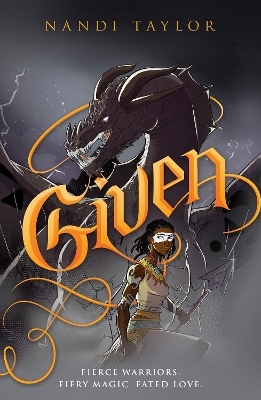“Well, because I am a woman who enjoys hunting, and learning about runes, and learning about combat, people act as if I am strange and unnatural.”
“Hmm,” Diedre and Zui said as one.
“But it was once very common for women to do these things. You know what I think? I think it is everyone else who is unnatural.”
Yenni yearns for more freedom. As a princess, she’s expected to marry the prince of a neighboring tribe, and he expects her to give up her “unfeminine” activities – hunting, weapons practice, and runelore, the magic practiced by the people of the Sha islands. So, she undertakes a journey, sanctioned by the gods, to the empire of Cresh in hopes of finding a cure for her father’s sickness. Enrolling at a prestigious Creshen university to learn more about their magic may be the only way to save him, but navigating Creshen culture and prejudice is an almost insurmountable obstacle she hadn’t expected – as is the interest from one very pushy dragon.
I liked Yenni. She’s strong, regal, and not afraid to work hard for what she wants. However, she was painfully oblivious to those who meant her harm, both unintentionally and intentionally. There’s a lot of racism directed at her, but Yenni doesn’t understand why they’re treating her differently – for instance, a classmate asks to touch her hair and then is startled when Yenni asks to touch hers back. It’s 90% through the book before Yenni starts really calling people on the racism – and that’s after she’s revealed as a princess. Most of it’s of the overt variety, rather than microaggressions, and the actions and Yenni’s failure to engage with it made the book read much younger than I expected. One thing that sat uncomfortably with me involved names. Yenni insists on being addressed as “Yenni Ajani” because, in Sha culture, it’s rude to only call someone by their first name unless they’re very close. However, because one-syllable names are only for gods in her culture, Yenni changes her friends’ Creshen names – Harth becomes Har-tha and Weysh becomes Wey-sha – without their input. It was a minor thing, but I didn’t understand why she couldn’t just explain to them why it bothered her and come up with nicknames together.
Weysh furrowed his brow, confused. “So I should simply leave her be?”
“If that’s what she wants.”
“But why? How would that endear me to her?”
Zui threw a quick, fond glance at Harth. “Because respecting a woman’s wishes is one of the most seductive things a man can do.” Weysh shook his head. It seemed incredibly counterproductive, but everything else he’d tried so far had been nothing short of disaster.
And then there’s Weysh. Frankly, he’s awful. His main fault is that he’s painfully honest – blunt to the point of rudeness, and past that. It’s telling that Yenni finds him “less beastly as a beast.” Frankly, he’s awful to pretty much everyone around him. Somehow, though, all of his friends tell Yenni that he’s hardworking, responsible, good with women – but we never actually see that in the book, we’re only told about it. Even during Yenni’s darkest moments, when she goes to him for comfort, he automatically turns the conversation back to himself – obviously, it’s his fault that she’s having problems because he didn’t take proper care of her! It’s only after Weysh is left partially disabled – unable to smell, which is a big deal for a dragon – that he realizes how badly he’s been treating Yenni.
So, what did I like? I loved the magic systems, both the Sha runelore and the Creshen magic. I would happily have read more about Uhad’s 67 laws of casting or why all their incantations need to have “source” in them, but unfortunately the surface is just barely scraped. Runelore, with its hymns and patterns in special paint, was equally fascinating and I loved all the parts involving Yenni explaining it or using it. Disappointingly, while Weysh realizes almost right away that runes would allow him to work magic in dragon form – Creshen magic relies on spoken triggers, and dragons can’t speak – they don’t get around to trying it out until three-quarters of the way through the book.
This is the first in a series, so the book ends without much of the plot points being resolved, leaving the ending a bit jumbled. Overall, this isn’t a badly written book, but it felt like it needed tighter editing to figure out what story is being told. Is it about Yenni’s quest to find a cure for her father’s illness? Her relationship with Weysh? Her adventures in Cresh at the university? I was never quite sure. I think this would work for for middle-grade readers, but it’s a bit light for the YA audience.
I received this book for free from NetGalley in exchange for an honest review. This does not affect my opinion of the book or the content of my review
